Ever wondered how the French foreign legion learns French fast? In a matter of months? The French Foreign Legion is an elite section of the French Army made up almost entirely of foreigners.
Men volunteer for many different reasons. Some come for the adventure—and the money. Others desperately want the French passport and the fresh start that comes with being a Légionnaire.
Being a Foreign Légionnaire is no walk in the park. The basic training is brutal, and if you pass it, you never know what war you'll be fighting.
However, South African-born Luciano says only one thing terrified him when he signed up.
“I wasn't scared about being in the military, or basic training, or even being sent to a war zone. I was just scared about having to learn a second language.”
Luciano

Yes, that's right. Everyone in the French Foreign Legion speaks French, and almost all recruits have to learn it during their 4-month basic training course.
And if you think that military life sounds tough, wait until you hear about the Legion's infamous Képi Blanc language learning method.
Keep scrolling to read about how the French foreign legion learns French fast. Or, if you prefer to watch rather than read, hit play on the video below.
Pro Tip
By the way, if you want to learn a new language fast, including French, my top recommendation is StoryLearning®, a fun and effective method that gets you fluent thanks to stories, not rules. Find out more and claim your free 7-day trial of the course of your choice.
How The Foreign Legion Learns French Fast: Foreign Legion Basics
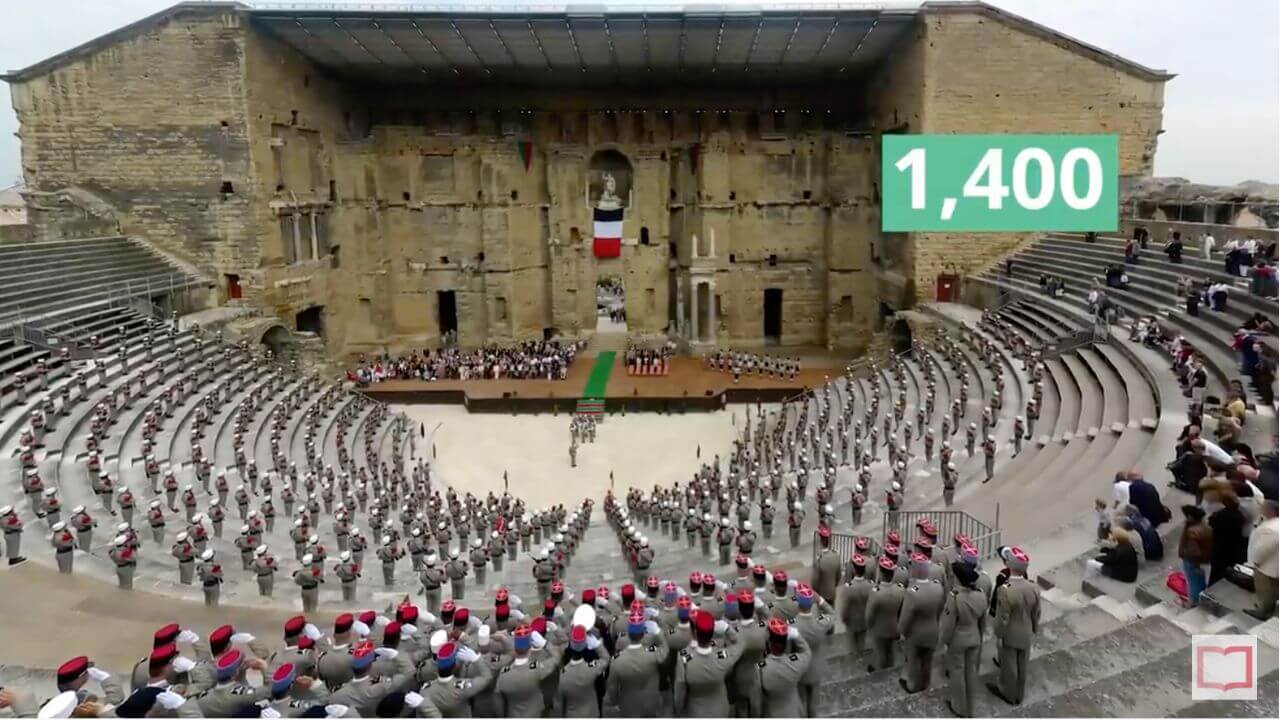
With more than 140 nationalities and 8000 members, the French Foreign Legion could be a melting pot of cultures. But it's not! Instead, the Legion has its own culture, training and traditions.
In a way, it's a law unto itself. Indeed, it's the only part of the French military where the soldiers swear allegiance not to France but to the Legion itself.
All applicants absorb the Legion's culture during their Basic Training at the Fourth Foreign Infantry Regiment near Castelnaudary, in southern France. Légionnaires call it “The Farm”. 1400 men went through this legendary boot camp in 2021—a training so tough that only one in ten men passed the test.
Enrolment
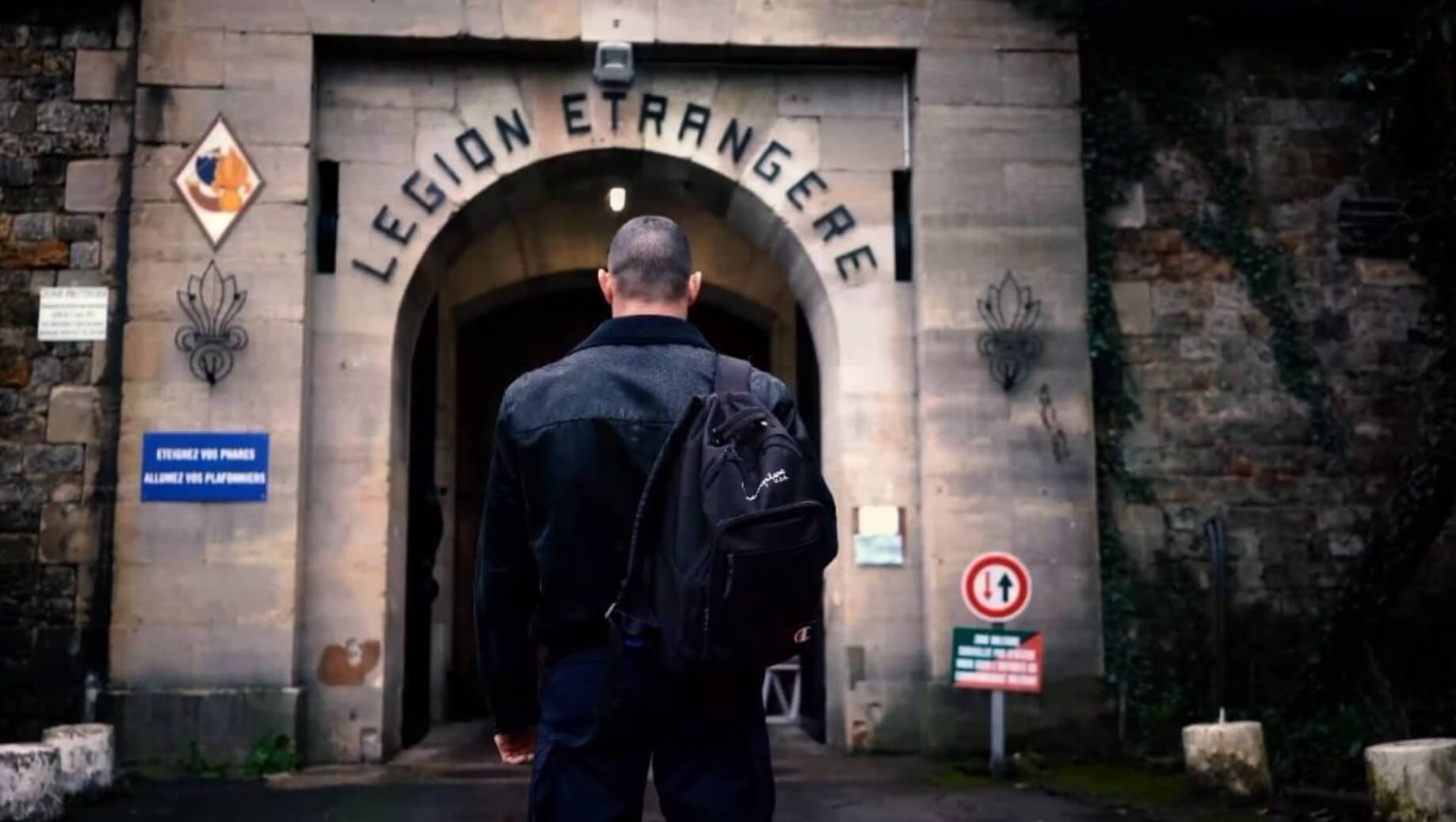
There is only one way to enrol in the French Foreign Legion. It doesn't accept emails, letters, phone calls or appointments. Instead, you must turn up in person at one of their recruitment centres in France and knock on the door.
The minute you're in, the tests begin.
The Tests
Légionnaires are famous for their toughness, so they begin to weed out candidates right from the start with a series of tests.
During your time at the centre, you must prove that you can:
- Read, write and speak proficiently in your native language
- Swim at least 25 metres
- Run a minimum of 2400 metres
- Pass physical and dental check-ups
- Complete many pull-ups and push-ups
- Undergo IQ, psychological and personality tests.
At the end of all this testing, you pass or fail. You're in — or you're out!
However, the one thing they don't test you on is French. It doesn't matter that you don't speak the language when joining the Legion.
What matters is that you learn to speak it FAST during the next four months.
Get ready to live, work and breathe in French.
The School

Recruits learn French 24-7 in their 17-week training at the Farm. There are two clear linguistic goals in mind.
- Be able to have a conversation in French.
- Learn the military vocabulary you'll need to function in your unit.
So, after ten days, you'll be able to say things like your blood group, ID number, and how your weapon works.
Oh yes, and respond to your new name. That's right. When you join the Foreign Legion, you get a new French name.
No one cares if you know five ways to say hello or can talk about the weather. And you won't be watching TV in the evenings, sipping wine (or beer) or even listening to the radio.
It's a great example of a whole language-learning lifestyle targeted to a specific purpose.
French Lessons On The Go
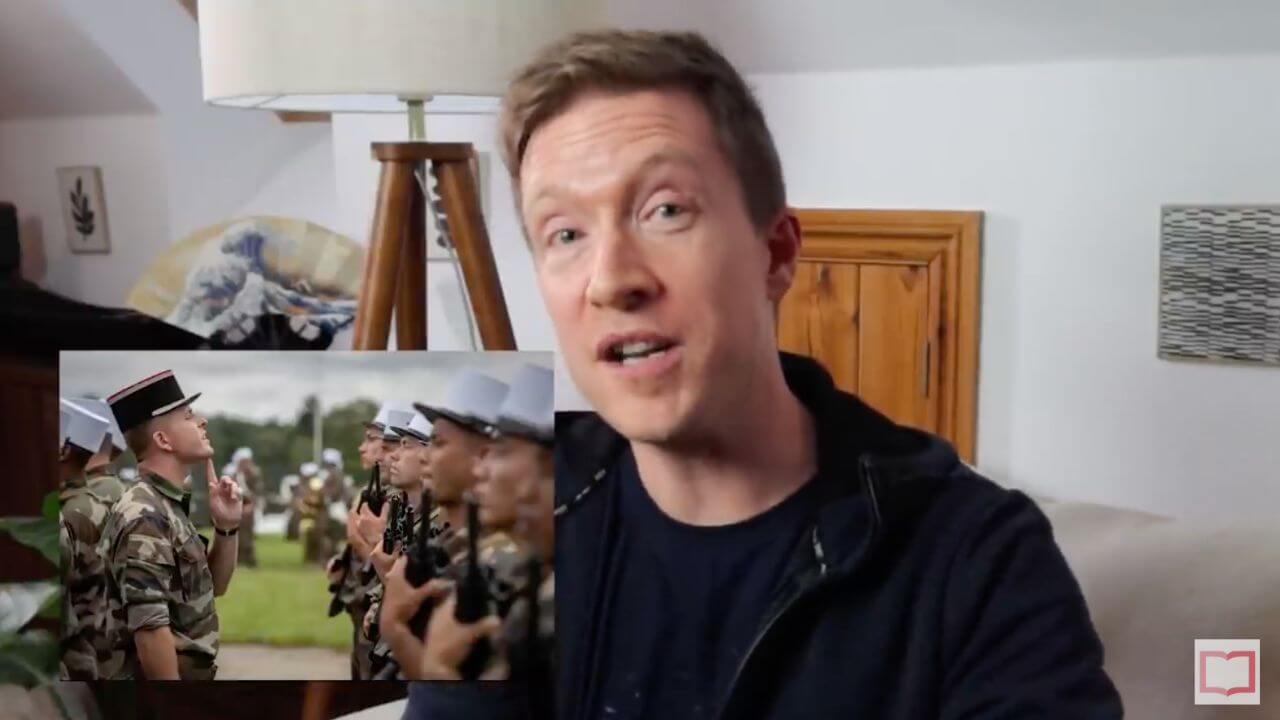
“Lesson” is a very loose term when discussing the Képi Blanc. Sometimes there are formal sessions in a traditional classroom with desks and a whiteboard.
But you could just as easily be out in the field gathered around your lieutenant while he gives a quick, impromptu lecture.
Formal lessons don't start until you've already been in the Legion for a few months.
But informal classes start from day one. As soon as you walk through the centre door, you must always speak French.
That's well before you know anything about how to conjugate verbs or whether a particular noun is feminine or masculine.
However, since most of the intake's 40-50 recruits don't speak a word of French, how do they manage?
Well, the Képi Blanc method is based on three key ingredients: Repetition, Incentive (i.e.punishment and promotion) and Immersion. They all work together to provide a perfect storm of language learning.
A Typical Day In The Unit
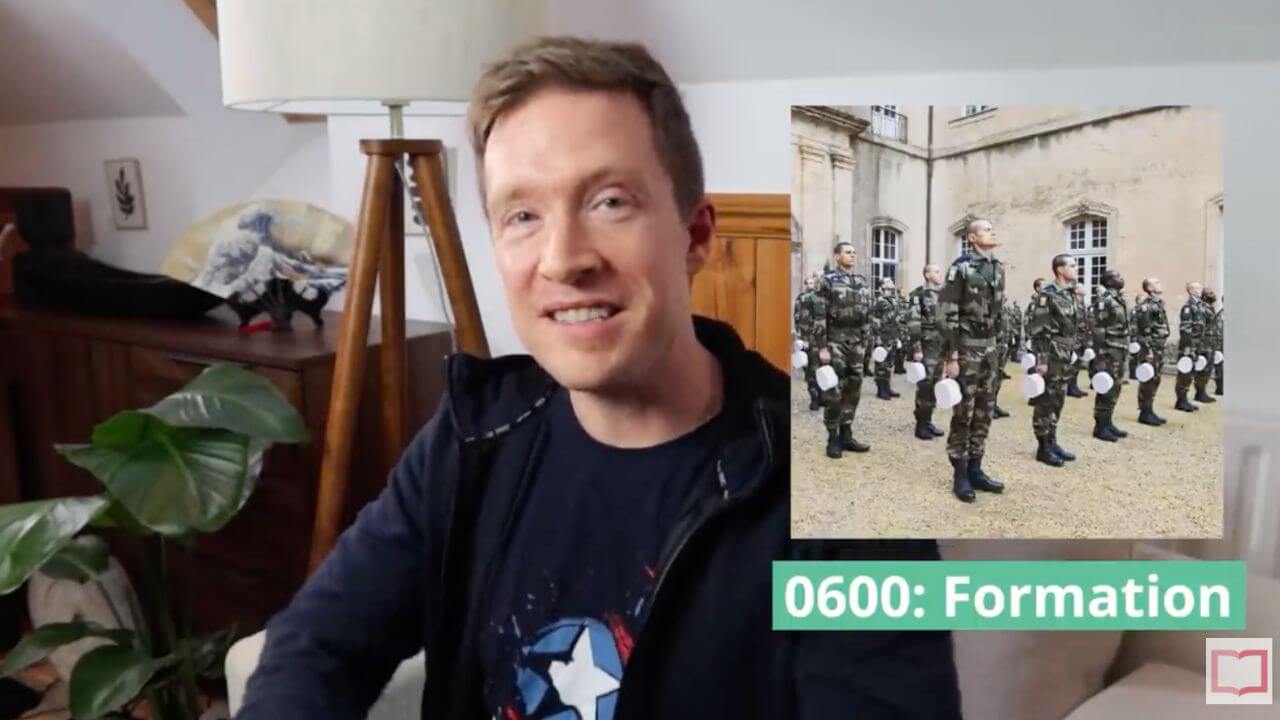
05:30: Roll call. Each soldier counts to ensure that nobody deserted during the night.
Luciano says the counting can be both frustrating and hilarious at first.
“So you'd be like one, two, three, four, and then someone makes a mistake, and everyone has to do push-ups.”
That's a massive incentive to learn to count past thirty in French ASAP.
06.00: Parade formation and breakfast, then work begins in earnest, with PT, Combat Exercises and Drills.
Midday: Lunch
More PT, Combat Exercises and Drills, followed by the evening meal.
20:00 Study time
22:00 Bed (or night combat exercises.)
And, of course, it's all done in French.
How The Foreign Legion Learns French Fast: Total Immersion
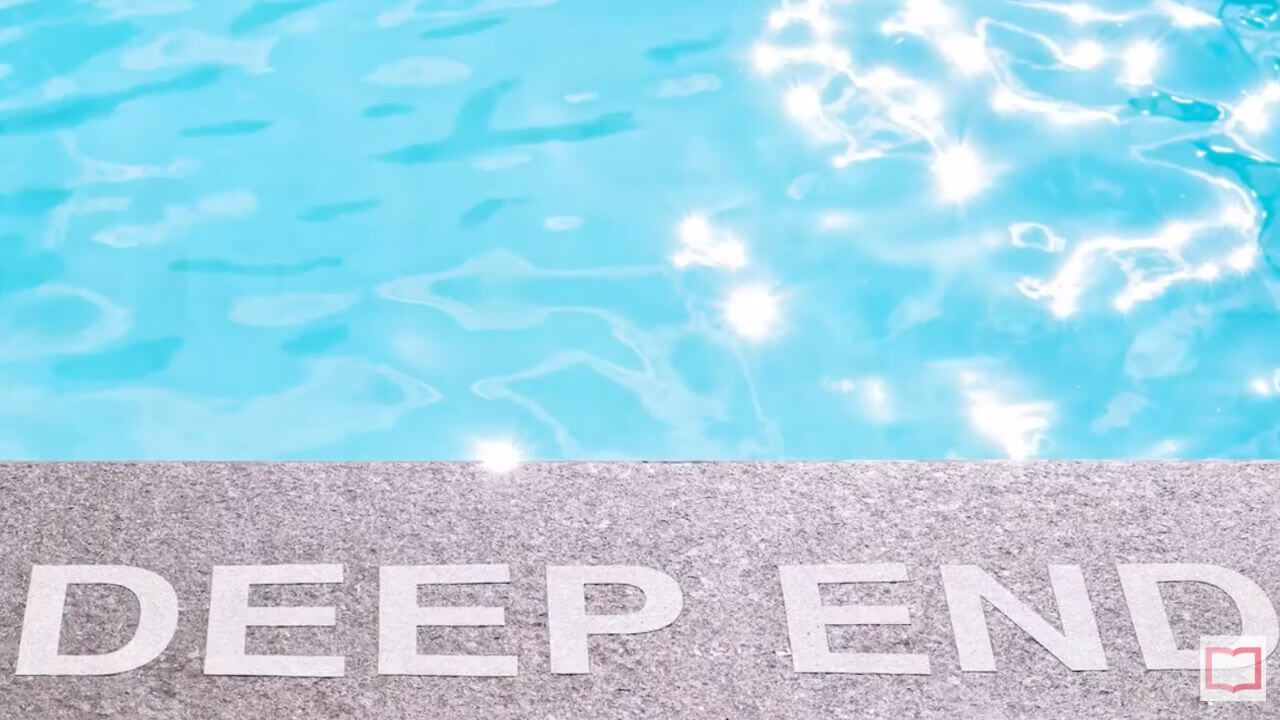
From day one, you have to think on your feet. You have to speak French when you phone the bank or the insurance company or go to town on the rare occasion you're allowed out in your dress uniform.
You get thrown into the deep end, completely immersed in the culture and language. It's sink or swim, so you have to get on with it.
So, by the time the more formal classes commence, you've already got a small vocabulary.
Luciano sees it like this:
“I think the most important part of what they wanted to teach us is understanding orders and being able to report back. That's basically what we did all day, every day; we would get orders, and we'd have to execute them.”
Fortunately, in each new intake, a few people speak some level of French. So, they understand the orders, more or less, and everyone else copies them.
“When they say go get a broom or a mop, you just watch somebody go and get it and you associate the word with what you need to get and that's kind of how you learn on the fly.”
Luciano
After a while, French seems to click in your brain. That often happens early on, thanks to the ceaseless orders and repetitive days.
What you do in the beginning carries on through the months, so you've really caught on to what's happening by the third month. Some Légionnaires even end up dreaming in French.
Instructors And Language Partners
French lessons at the Farm flow naturally as part of life in training. For example, your instructor isn't a trained teacher. He's just your usual lieutenant — usually a native French speaker — who happens to be drilling you in French along with everything else.
But, although you're thrown in at the deep end, you do get a Binôme, or Francophone, as a language partner to help you through.
The Francophones

Recruits team up with Francophones, i.e. recruits who've come from French-speaking countries like Belgium or Benin and can already speak French. The ratio usually works out to be about one Francophone to between five and ten non-French-speaking recruits.
It's their job to make sure you understand because you get hazed when you make a mistake. But the Francophone gets punished too.
So, it's in the best interest of the French speaker to make sure that everybody understands what's going on, which is tricky when there's no common language between them all.
Francophones must also check up on their charges to ensure they're up to scratch, a bit like a drill sergeant but without the stripes.
This system causes a fair bit of friction because Francophones are recruits with no authority over their language partners except that they speak French.
Sometimes you've got no idea what you're meant to do. Luciano well remembers the occasion when his Francophone sent him to fetch something from the truck.
“I brought back the toolbox… but all he wanted was the fire extinguisher. Because I didn't understand and brought the wrong thing we both ended up doing relay laps around the building carrying the heavy toolbox over our heads.”
Luciano
Two Incentives To Learn French Fast
Punishment

One huge incentive to learn French as fast as possible is the physical punishment, or hazing, that happens every time you make a mistake.
The standard response to any mistake is… push-ups, which you must count in phonetic french un, deux, trois etc. Too bad if you forget a number — you have to go back and start again.
Other hazing includes running or even crawling around the building — usually when you're already exhausted from the physical and mental stress.
But, fall asleep where you shouldn't, and your head goes into a bucket of cold water. And if you happen to be late to class, or a meal, guess what's likely to happen if you can't give a sensible reason in French.
Punishment gives recruits plenty of motivation to learn French ASAP.
Promotion
Another incentive is your potential promotion to a regiment for speciality training.
It could be desert, snow, or jungle training — all very unique situations requiring fast learning and vocabulary specific to that mission.
Once trained, you're deployed to a foreign country.
You can speak at least two languages, French and your native tongue, by that time. So, Légionnaires use French to talk to each other and rely on their native languages to communicate with the country's citizens.
So, French is critical for communicating with each other, not the locals, and you're not considered combat-ready until you speak it.
Luciano says the best advice he can give is to keep your eyes on your goal and never give up.
Repetition

Drill, drill, drill.
Repeat every hour that you're awake.
That's the Képi Blanc teaching method — and it works!
The point of the lessons is not to progress individuals but to get every recruit to the same base level in French.
Of course, the exercises get more complex each week, with new vocab, sentences and situations to learn.
Formal classes happen late at night, between 8 and 10 pm, after having already done a hard day's work. And the point of those classes is to learn the meanings of the words and phrases you've been repeating ad infinitum during training.
So in class, the lieutenant writes the verbs or the sentences on the board, and you will repeat them until they stick.
Whenever possible, there's a visual component to the lesson. So, for example, the lieutenant orders a recruit to jump on the table and everyone repeats, “he's on the table.” Or the recruit might crawl underneath, and everybody says, “he's under the table.”
Songs help too.
Whenever you move anywhere, it's always in formation, and you sing while you walk or run. Légionnaires will sing in French every day during their five years of service.
Learning Materials

The majority of language learning happens as you go. It's different from other intensive schools like the Mormon Missionary Training Centre or the US Military's DLI, which are more classroom-based.
However, every Légionnaire has a “Carnet du Légionnaire,” the essential training manual or instruction book.
It contains all the weapon systems you need to master, such as tactics, Legion history, etc.
Most lessons are based on the manual because you need to know that book inside and out by the time you've finished your basic instruction.
Every day is the same. It combines the repetition of basic, functional French — either spoken or sung with essential military lessons.
It's unambiguous; a smart approach when you remember that these men come from all walks of life with diverse literacy and education levels.
Homework
Homework at the Farm aims to implement what you've learned. So you learn during the day, and then you practice it together at dinner, in the morning, in every spare moment.
Luciano's partner instituted a constructive homework habit.
“At the end of the day I had to go and tell my Francophone what I had done during the day… what I ate, what activities we did and so on. It really helped me progress in French because I learned how to actually explain something, not just give (or receive) an order.”
Luciano
It helped so much that Luciano did the same thing when he became a corporal and had to help his own new recruits.
Stress Adds An Extra Component
The Legion puts you under constant stress, but Luciano says he was surprised to find that brains can learn faster under a certain amount of stress.
“I was surprised that I learned so quickly, so many things. In my combat medic course, we were learning medical terminology and protocols in French, and I thought it would be impossible. But with the stress and panic, your brain turns into a sponge, and it all seems to stick.”
Luciano
The FFL Dialect
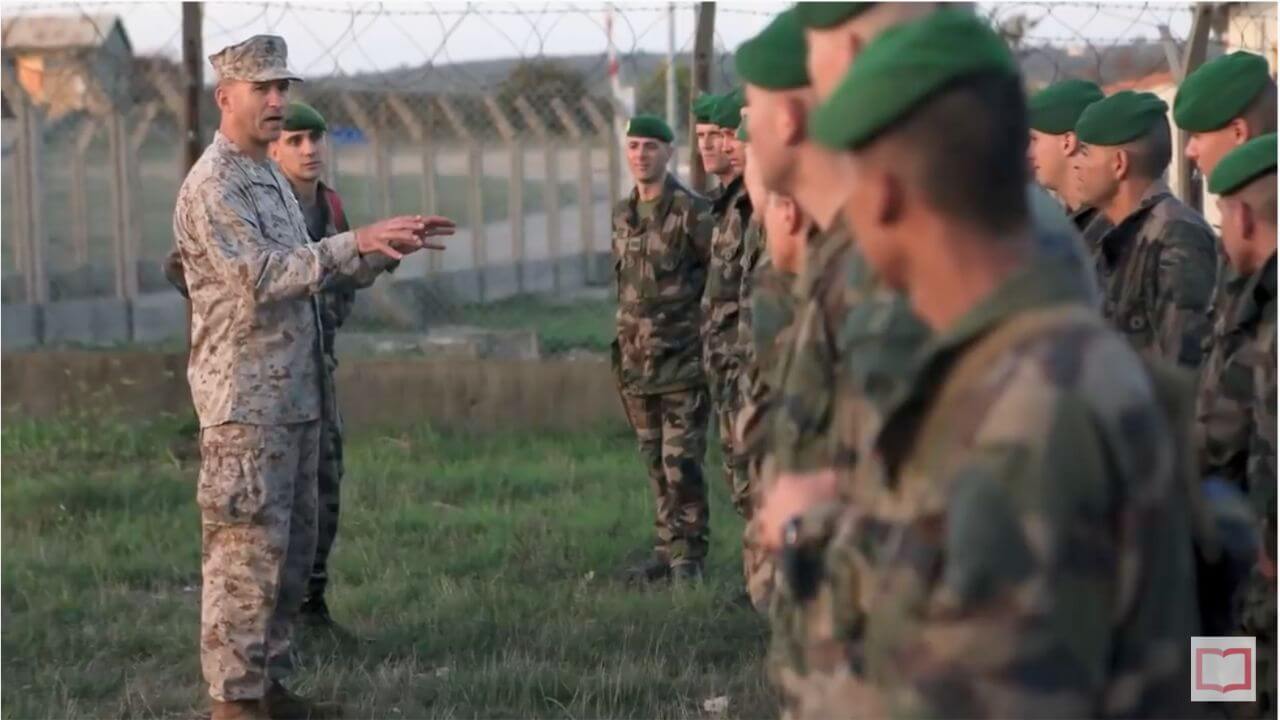
French is the national language of many countries, but each has a dialect that differs from how French people speak.
Not surprisingly, Légionnaires don't end up speaking pure French but rather a dialect all of their own, with phrases, expressions, pronunciation and accents that might be incomprehensible to a native French person.
That makes it even harder for the Francophones because sometimes even they don't understand the orders.
Luciano explains:
‘We use a lot of words that come from all different languages mixed together and used as expressions that don't exist in France. E.g. We say “boule de fer” (ball of fire). French people don't use that at all, but for us, it means something's really cool, or we had a great time.”
Luciano
It is such a unique situation; a disparate bunch of men from all corners of the world, developing the language for a particular purpose over many years. It's no wonder they ended up creating their own dialect.
Does The Képi Blanc Method Work?
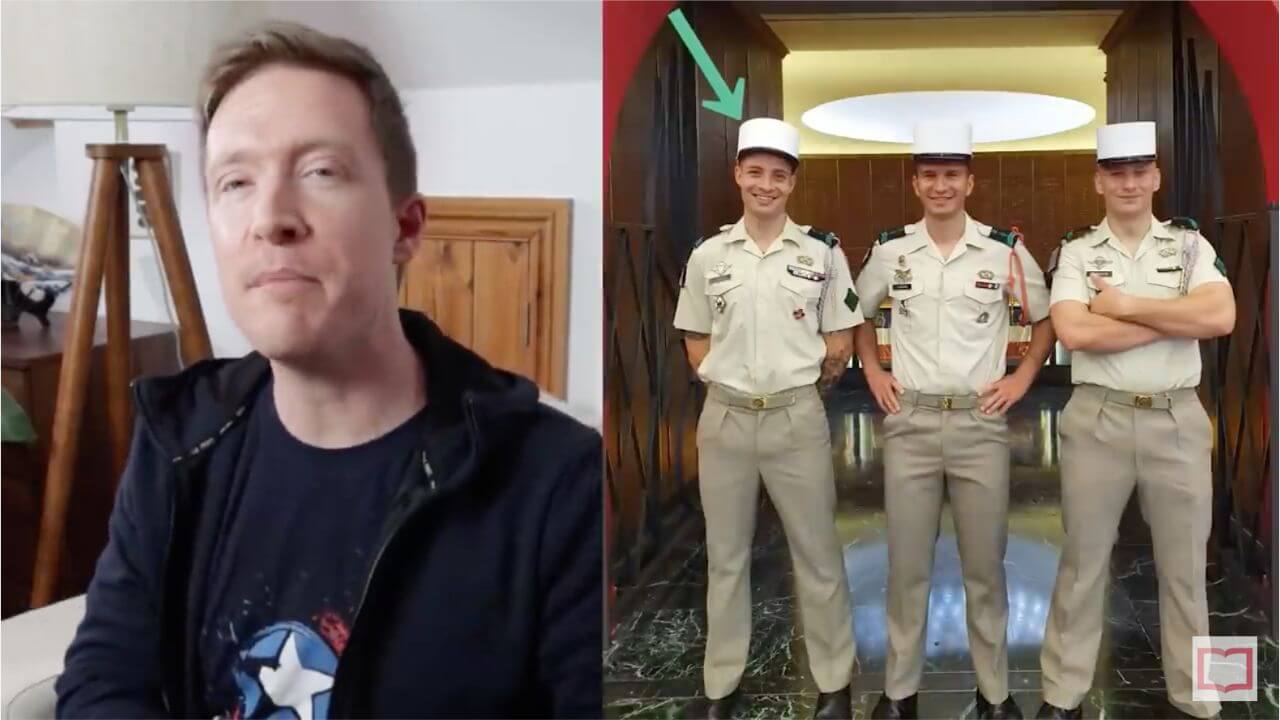
The average Légionnaire reaches about an intermediate conversational level in French.
Luciano points out that he studied Afrikaans for ten years in South Africa and never got to a conversational level. But in the Legion, he could have a decent conversation after four months.
He says:
“The method that's tried and proven in the French Foreign Legion is they force you to speak French all the time, and that's honestly what works.”
Luciano
After his basic training, Luciano became a combat medic and did multiple courses that required a good level of French. After his time in the FFL, he stayed in France and is now at university there.
So there were many reasons why he was able to make the most of the language learning situation he found himself immersed in.
How The Foreign Legion Learns French Fast
You can see why the French Foreign Legion would use this brutal immersion method. They have to take raw recruits from many different countries and backgrounds and get each one to be able to speak and understand French in a short time.
However, if you're not joining the FFL, you might prefer to learn languages by reading stories, which is exactly what the StoryLearning® method is all about.
If you're curious to know more about the method, then check out Jannah's story about how she learned Japanese in 6 months through story.

Olly Richards
Creator of the StoryLearning® Method
Olly Richards is a renowned polyglot and language learning expert with over 15 years of experience teaching millions through his innovative StoryLearning® method. He is the creator of StoryLearning, one of the world's largest language learning blogs with 500,000+ monthly readers.
Olly has authored 30+ language learning books and courses, including the bestselling "Short Stories" series published by Teach Yourself.
When not developing new teaching methods, Richards practices what he preaches—he speaks 8 languages fluently and continues learning new ones through his own methodology.










































